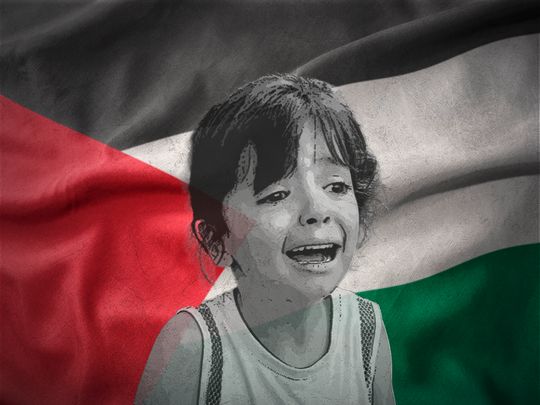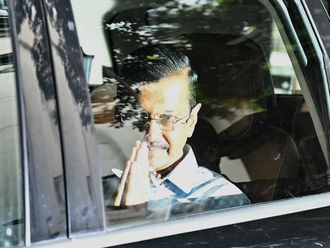
When the downtrodden or, in the words of Frantz Fanon, the wretched of the earth, mark a commemorative day, it is often done to mark a painful moment in their past, a moment that continues to gnaw at them like a raw wound in the present. Yet to these people, remembrance on that day is also an act of self-assertive moral optimism about the future as well as a rite of exorcism of the collective trauma that had demonised their history.
So, just as Black History Month, which got underway this week, is a reminder that we cannot understand American history in isolation of slavery, known as America’s original sin, so is Day of the Land, which was commemorated by Palestinians on March 30, a reminder that we cannot expect to understand the root-cause of the century-old conflict in the Holy Land in isolation of the catastrophic impact that the creation of Israel in Palestine has had, and continues to have as we speak, on the daily lives and political destiny of the Palestinian people.
Next to Day of the Nakba, observed on May 15 each year, Day of the Land, a time when Palestinians are expected to reflect on the sanctity of their national land and highlight, as much to themselves as to the world at large, Israel’s relentless campaign since 1948 to colonise it, is probably the most important commemorative event in modern Palestinian history.
Fire in the blood
The day was celebrated by Palestinians wherever they were found, in the homeground as in exile — and the world celebrated with them. Tens of thousands of people in cities across the US marched in solidarity with them, as did countless others across the globe, including in cities across England, where Jeremy Corbyn, the UK member of parliament and former leader of the Labor Party, addressed a crowd of well over 100,000 people gathered around Marble Arch in London.
All well and good. Support for Palestinians has always been instinctive in countries across the Global South and occasionally bubbled to the surface in the West, where it was kept somewhat muted.
Now, however, Israel’s assault on Gaza, nakedly orgiastic in its vindictiveness, unspeakable in its brutality, has opened the floodgates of that support — demonstrative support unprecedented in breadth that has driven Israel to lose the narrative. Some mighty genie has escaped the bottle and there is fire in its blood!
For Palestinians — as for people elsewhere in developing countries, where cultivation of the land represents these people’s foundational story as a community — that land is very much their identity, indeed an expression of their humanity and sense of self.
You would imagine someone like Yoav Gallant, Israel’s defence minister (he who claimed that Palestinians are “human animals”), privately voicing the words of Japanese Admiral Isoroku Yamamotu, who planned the attack on Pearl Harbor, when he wrote in his diary, “I fear all we have done is to awaken a sleeping giant and fill him with terrible resolve”.
Again, all well and good. But what, at its core, is Day of the Land that Palestinians observed last Saturday? What place does the meaning of land occupy in the collective consciousness of the people of Palestine? What is the nature of kinship or, if you wish, the organic relationship between a traditional people like the Palestinians and their land?
What does Israel actually do when, say, it robs a Palestinian family of the land they had tilled for generations in the West Bank, or when it bombs a strawberry farm (yes, pre-war Gazans owned and cultivated strawberry farms that produced a surplus of the fruit, which was shipped for export), reducing it to dust?
'This is our land'
And what kind of turmoil occurs in the internal psychic economy of a Palestinian farmer or peasant who is forcibly severed from the land that he, his parents, his grandparents and perhaps his great-grandparents had cultivated all their lives and depended on for their survival?
Look, land in the US and other capitalist countries in the West is seen as real estate, as property or at best as a bulwark of the cash crop economy. For Palestinians — as for people elsewhere in developing countries, where cultivation of the land represents these people’s foundational story as a community — that land is very much their identity, indeed an expression of their humanity and sense of self.
In Palestine, often what constitutes your nobility as a man lies in how you fondly invest your labour in the land you work — a posture of sensibility from which emerges the common saying, ardi-a’ardi, that is, “My land, my honour”.
At the intimate centre of that posture, you locate the Palestinians’ sense of communion with earth, with their acre, with their ways of knowing, being and valuing, coupling.
Thus, when Israel expelled close to a million Palestinians from their land in historic Palestine in 1948, and then began to expel them in the occupied West Bank, it effectively sentenced these folks to death by a thousand cuts.
That was what Day of the Land was about late last week — remembrance and resolve.
Remembrance that this is our land. Chez nous. Esta es nuestra tierra. Hazi ardi. And resolve that in the hearts of those who tilled the land, harvested its bounty and loved it as they loved their children, the ard will always be there for us, mapping the geography of our national soul.
— Fawaz Turki is a noted academic, journalist and author based in Washington DC. He is the author of The Disinherited: Journal of a Palestinian Exile







_resources1_16a45059ca3_small.jpg)

